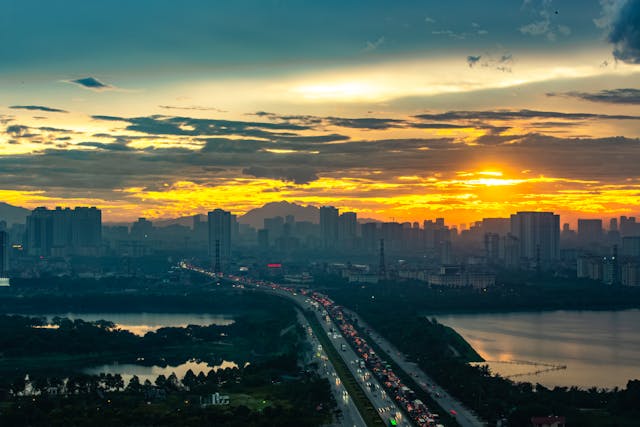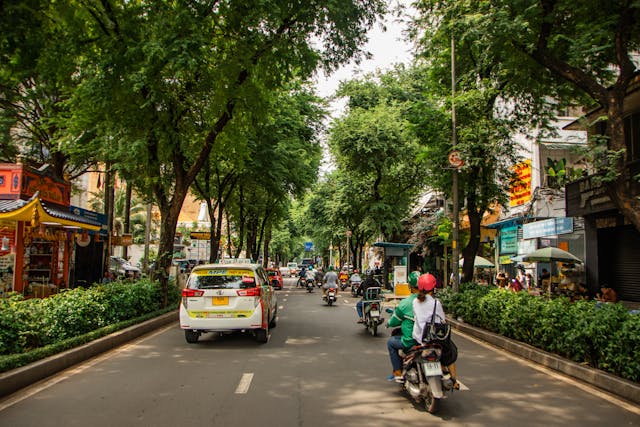Vietnam is one of the world’s most attractive destinations for expatriates — combining low prices, fast internet in major cities, warm weather, and an exciting culture.
But exactly how much does it cost to live in Vietnam as an expat?
This detailed breakdown covers monthly budgets, rent, food, transport, healthcare, visas, and money-saving tips so you can plan your move with confidence.
Quick snapshot: single expat monthly costs (excluding rent) often fall in the $300–$600 range in smaller cities, while a comfortable life in Hanoi or Ho Chi Minh City typically runs $600–$1,200 per month depending on lifestyle and housing choices.
Monthly budget by lifestyle and city
-
Shoestring/backpacker: $400–$600/month — dorms, street food, slow travel.
-
Comfortable expat: $900–$1,600/month — private 1-bed apartment, regular dining out, coworking.
-
Family or upscale: $2,500+/month — international school fees, larger apartment, imported goods.
City matters. Ho Chi Minh City is generally the most expensive, followed by Hanoi and Da Nang. Smaller cities such as Can Tho, Hue, or provincial towns are dramatically cheaper for rent and daily expenses. Cost indexes from crowd-sourced databases show clear city gaps for money planners.
Rent & housing — your single biggest expense
Rent is the biggest variable. Expect broad ranges:
-
Ho Chi Minh City (District 1–3): small furnished 1-bed from $400–$900+/month; nicer apartments $1,000–$2,000.
-
Hanoi (Old Quarter / Tay Ho): 1-bed from $350–$800/month; upscale units cost more.
-
Da Nang / smaller cities: one-bed apartments from $200–$500/month.
Recent reporting highlights upward pressure on rents and apartment prices in major cities as demand grows and construction costs rise — something long-term expats should watch if budgeting for housing.
Tips: Sign longer leases (6–12 months) to negotiate lower rents; use local agents for best deals; inspect utilities (generator, water, internet) before committing.
Food — cheap and delicious
Vietnamese food is both affordable and varied:
-
Street food & local eateries: $1–$3 per meal (pho, bun cha, banh mi).
-
Mid-range restaurants: $3–$10 per person.
-
Western/imported groceries: higher — expect to pay Western prices for imported cheeses, wine, and specialty items.
Eating like a local dramatically cuts your food budget and gives you a tastier immersion. Many expats budget around $150–$300/month for food depending on how often they eat out and whether they buy imported products.
Transport — cheap and flexible
Transportation is another big saving area:
-
Motorbike rental: $6–$15/day; monthly rentals and long-term purchases are cheaper.
-
Ride-hailing (Grab): inexpensive for inner-city trips — often $1–$5 per short ride.
-
Public buses and trains: very affordable for longer distances; domestic flights have frequent promos.
If you plan to buy a motorbike, factor in registration, helmet, and maintenance — but it’s still an economical and flexible option that many expats prefer.

Healthcare & insurance
Vietnam’s private hospitals in major cities (Ho Chi Minh City, Hanoi, Da Nang) deliver good care at lower prices than Western countries. Routine doctor visits, dental care, and basic diagnostics are affordable, but for major procedures many expats still choose to return home or use international insurance. Recommended budgeting:
-
Local clinic visit: $10–$40.
-
Private hospital stay / serious care: potentially several hundred dollars per night.
-
International health insurance: $500–$2,000/year depending on age and coverage.
Most expats choose a comprehensive international plan that covers evacuation for serious medical events.
Visas, permits & bureaucracy
Many long-term expats live in Vietnam on work permits, investor visas, or long-term business/residency arrangements. Short-term tourists can use the e-visa (where eligible) for stays up to 30 days, but long-term residency requires sponsorship, paperwork, and legal fees. Budgeting for visa runs, extension fees, and visa-service support (if you don’t want to handle it yourself) is important — annual visa costs and agent fees can add several hundred dollars or more each year. See expat guides for current visa rules and procedures.
Utilities, internet & extras
-
Electricity & water: $30–$100+/month depending on AC use. Electricity can be costly if you run air-conditioning constantly.
-
Internet & mobile: Good home broadband plans are affordable (from ~$10–$25/month). Local SIM/data plans are cheap and plentiful.
-
Gym / coworking: Coworking spaces in Hanoi/Ho Chi Minh start around $60–$120/month; gym memberships similar.
Sample budgets (monthly, mid-range lifestyle)
-
Ho Chi Minh City (single expat): Rent $700 + Food $250 + Transport $50 + Utilities/Internet $80 + Entertainment $150 = ~$1,230/month.
-
Hanoi (single expat): Rent $600 + Food $200 + Transport $40 + Utilities/Internet $70 + Entertainment $120 = ~$1,030/month.
-
Smaller city (single expat): Rent $300 + Food $150 + Transport $30 + Utilities/Internet $50 = ~$530/month.
Use crowd-sourced sites to refine these numbers for your exact neighborhood and lifestyle.
Money-saving tips for expats
-
Eat local — street food and local restaurants are delicious and cheap.
-
Choose neighborhoods wisely — live outside the most touristy districts for lower rent.
-
Negotiate long leases — landlords often prefer stability.
-
Use local services — local gyms, markets, and repair shops are cheaper.
-
Monitor the housing market — new housing projects, policy shifts, and construction trends (reported by major outlets) can affect rents.
Final thoughts
Vietnam offers a compelling combination of affordability and modern conveniences that make it a favorite among expats and remote workers. Whether you’re planning to stretch a tight budget in a smaller city or enjoy a comfortable expat life in Ho Chi Minh City or Hanoi, careful planning — especially around housing and healthcare — will let you enjoy the best of Vietnam without overspending.
Sources & Resources
-
Numbeo — Cost of Living in Vietnam (city comparisons and crowd-sourced prices).
-
Expatistan — Vietnam cost index and city comparisons.
-
Vietnam Briefing — practical expat guides, visas, and wages.
-
Vietnam Airlines Travel Guide — living cost overview and practical tips.
-
Wise / Cost of Living tools — city comparisons and indexing.
Featured Image: City Traffic in Ho Chi Minh | Photo by Tường Chopper
Read more Vietnam travel articles.

